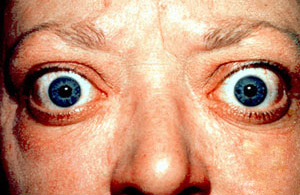Table of Contents
Graves’ Disease: Symptoms, Causes & Effective Management
Graves’ disease is an autoimmune condition causing hyperthyroidism (overactive thyroid), characterized by the overproduction of thyroid hormones. This imbalance accelerates your body’s metabolism, impacting your health, energy levels, and quality of life.


Quick Facts
- Prevalence: Affects approximately 0.5-1% of the population worldwide.
- Common Symptoms: Rapid heartbeat, weight loss, anxiety.
- Affected Population: Most common in women aged 20-50, though it can occur in any age group.
Understanding Graves’ Disease
Graves’ disease occurs when your immune system mistakenly attacks the thyroid gland, prompting excess thyroid hormone production. This autoimmune response significantly influences metabolic rate, heart function, and emotional well-being.
Common Symptoms
Early identification and treatment improve management and outcomes:
- Rapid or irregular heartbeat (palpitations)
- Anxiety, irritability, and mood swings
- Unexplained weight loss despite normal or increased appetite
- Tremors in hands or fingers
- Heat sensitivity and increased sweating
- Fatigue and muscle weakness
- Enlargement of the thyroid gland (goiter)
- Bulging eyes (Graves’ ophthalmopathy)
Causes and Risk Factors
While the exact cause of Graves’ disease is unclear, several factors contribute to its development:
- Genetics: Family history increases risk.
- Gender: Significantly more common in women.
- Stress: Emotional or physical stress may trigger symptoms.
- Smoking: Linked to higher risk and severity, especially Graves’ ophthalmopathy.
Diagnosis
Diagnosis typically involves:
- Medical History: Evaluation of symptoms, family history, and lifestyle factors.
- Physical Examination: Checking thyroid size, heart rate, and signs of eye involvement.
- Blood Tests: Measuring thyroid hormone levels (TSH, T3, T4) and thyroid-stimulating antibodies (TSI).
- Imaging Tests: Ultrasound or radioactive iodine uptake scans assessing thyroid activity.
Effective Treatments and Management
Graves’ disease management focuses on normalizing thyroid hormone levels and alleviating symptoms:
- Medications: Anti-thyroid drugs to reduce hormone levels; beta-blockers to manage heart symptoms.
- Radioactive Iodine Therapy: Permanently reduces thyroid activity in more severe cases.
- Surgical Treatment: Partial or complete thyroidectomy in selected cases.
- Lifestyle Modifications: Stress management, balanced nutrition, regular monitoring, and avoiding smoking.
Potential Complications if Left Untreated
Without proper treatment, Graves’ disease can lead to serious complications:
- Heart conditions, including irregular heartbeat and heart failure
- Bone density loss (osteoporosis)
- Graves’ ophthalmopathy causing vision problems
- Thyroid storm, a severe and potentially life-threatening condition
When to See a Doctor
Seek medical advice promptly if experiencing symptoms such as rapid heartbeat, unexplained weight loss, anxiety, or noticeable changes in your vision or neck area. Early diagnosis greatly improves management and quality of life.
Practical Tips for Living with Graves’ Disease
Effective daily self-care strategies include:
- Regularly attend medical appointments to monitor thyroid function.
- Maintain a balanced diet rich in nutrients to support overall health.
- Engage in stress-reducing activities like yoga, meditation, or gentle exercise.
- Protect your eyes using sunglasses and scheduling regular ophthalmology check-ups.
- Join support groups for emotional and practical guidance.
Recent Research and Advances
Ongoing research continues to enhance understanding and treatment:
- Development of more targeted medications to better manage autoimmune responses.
- Genetic studies identifying risk factors and potential preventive strategies.
- Advances in minimally invasive surgical techniques for thyroid management.
Frequently Asked Questions
Is Graves’ disease curable? Currently, there is no cure, but symptoms can be effectively managed through medication, lifestyle changes, and medical treatments.
Does Graves’ disease affect pregnancy? Yes, unmanaged Graves’ disease can pose risks during pregnancy, making close medical monitoring essential.
Can lifestyle changes help manage Graves’ disease symptoms? Yes, stress management, dietary adjustments, and avoiding triggers like smoking can significantly reduce symptoms and improve quality of life.
Additional Content
For comprehensive information on the various treatments you can explore our Autoimmune Disease Treatment page. If you are seeking expert medical advice, our Top Autoimmune Doctors section provides a list of highly recommended specialists. Additionally, for an overview of other autoimmune conditions, visit our Autoimmune Diseases page.